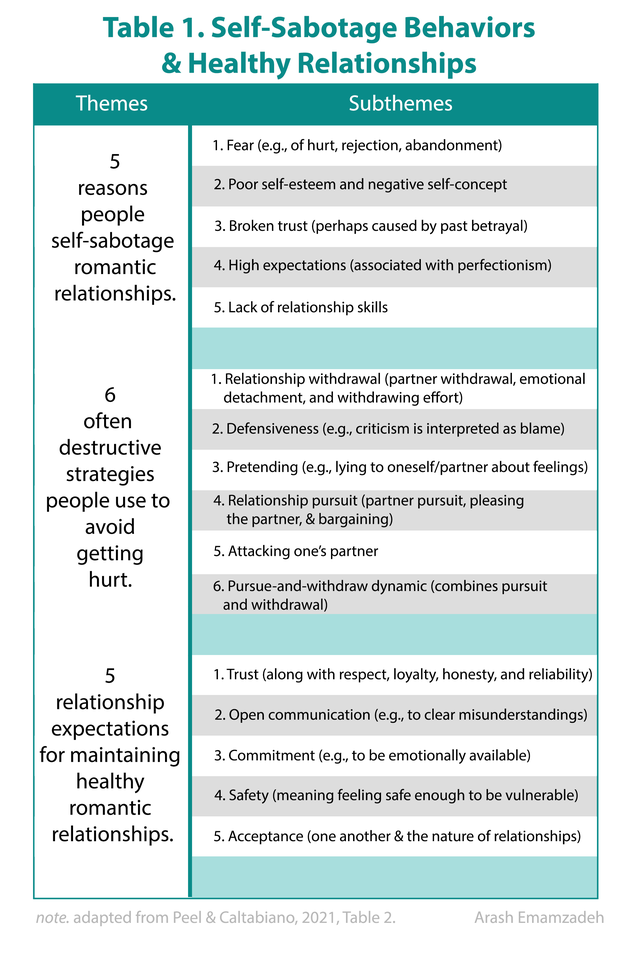Relationships
5 Reasons Why Some People Keep Sabotaging Their Relationships
We sabotage love for a variety of reasons (e.g. fear, trust difficulties).
Posted August 20, 2021 Reviewed by Ekua Hagan
Key points
- People self-sabotage love for various reasons, like fear, poor self-esteem, trust issues, high expectations, and inadequate relationship skills.
- To avoid getting hurt in relationships, people engage in a number of strategies, such as withdrawal, defensiveness, and attacking their partners.
- Strategies for maintaining romantic relationships include trust, open communication, commitment, creation of safety, and mutual acceptance.

New research by Peel and Caltabiano, published in the most recent issue of the quarterly journal, Journal of Couple & Relationship Therapy, discusses reasons we self-sabotage love. Note, romantic self-sabotage refers to the use of self-destructive actions in romantic relationships intended to “impede success or withdraw effort and justify failure.”
The investigation’s findings are summarized below.
The data for the study was collected from an online survey. An international sample of 696 individuals with relationship experience was recruited. At least 50 countries were represented, with 47% (mostly students) coming from Australia. The average age was 31 years (range of 15 to 80 years); 75% female; 80% heterosexual; 62% in a romantic relationship.
An analysis of responses revealed four themes:
Self-sabotage reasons
Participants gave five types of reasons as to why they sabotage their romantic relationships.
- Fear: Such as fear of getting hurt (e.g., having one’s heart broken), rejected, or abandoned. Also fear of commitment, betrayal, intimacy, failure, and loneliness.
- Poor self-esteem or negative self-concept (e.g., feelings of inferiority).
- Trust difficulties: Sometimes these were caused by past betrayal.
- High expectations: Associated with perfectionist tendencies and having destined beliefs (i.e. fairytale fantasies).
- Inadequate relationship skills: Due to immaturity, inexperience, etc.
Techniques to avoid getting hurt
Respondents reported engaging in a variety of destructive behaviors to protect themselves.
- Relationship withdrawal. A. Partner withdrawal: Permanently or temporarily maintaining physical or emotional distance (e.g., withholding, unavailability), called “shutting down” or “stonewalling.” This tactic was used in reaction to feeling overwhelmed, in anticipation of the partner doing the same, or with the intention to force the partner to act (e.g., to initiate the breakup). B. Emotional detachment: Concealing or not expressing emotions, or emotionally “checking out” as a way to escape feelings. Sometimes the person relied on more destructive techniques, like drinking, drugs, or self-harm. C. Withdrawing effort: No longer making an effort due to the feeling that one’s effort is not valued or will only lead to conflict.
- Defensiveness: Feeling righteously indignant. For instance, interpreting criticism as blame and thus feeling victimized. Sometimes defensiveness was due to past criticism; other times, it was meant to prevent future hurt.
- Pretending: Lying to oneself or partner about one’s thoughts, feelings, or the state of the relationship (e.g., “Things are just fine”). This was done for reasons related to financial security, fear of how the partner might act, the safety of children, etc.
- Relationship pursuit: A number of individuals reported holding on to relationships very tightly, by engaging in partner pursuit (desperately seeking an emotional connection and demanding a response), trying to please one’s partner (seeking approval and validation at the cost of hiding and ignoring one’s own needs), and engaging in bargaining (begging and promising to do anything to keep the partner/relationship).
- Attacking one’s partner: Some reported constantly criticizing or blaming their partners—doing so to protect themselves or hold power in the relationship.
- “Pursue and withdraw” dynamic: This was a combination of the pursuit and withdrawal tactics (e.g., pulling away when the partner is needy but clinging when the partner is avoidant).
Insight into self-sabotage
Only some participants successfully identified their destructive patterns. They described how their current relationships were damaged by their concerns and behaviors—e.g., not knowing how to break up, feeling trapped, expecting rejection, fear of abandonment, self-sacrificial tendencies, attraction to unsuitable mates, or feeling unsafe.
To illustrate, a female participant explained, “I am not good at breaking up with people. I generally just sabotage the relationship in some way so it deteriorates and then it can just end ‘naturally.’”
Strategies for maintaining healthy romantic relationships
The following five themes were identified when respondents discussed their expectations regarding successful and healthy relationships.
- Trust: Trust was often mentioned along with respect, loyalty, honesty, and reliability. For those who experienced infidelity, lack of trust was a major reason why their current relationships were not thriving.
- Open communication: To clear misunderstandings, prevent hurt, manage expectations, etc.
- Commitment: Commitment was often discussed along with a willingness to be emotionally available, put in the effort, be proactive about solving conflicts, collaborate with the romantic partner, and not take the relationship for granted.
- Safety: Feeling safe was seen as a requirement to be vulnerable in the relationship without experiencing fear.
- Acceptance: Not only accepting each other but also accepting the inevitability of occasional hurt, which can occur even in romantic relationships where both partners are trying their best.
Concluding thoughts on self-sabotage in relationships
People sabotage their romantic relationships mainly to protect themselves. Nevertheless, the above research shows, self-protective strategies often result in self-sabotage when driven by the desire to validate negative beliefs about oneself (e.g., not being worthy of love, expecting rejection and abandonment).
For a summary, see Table 1.

So, how can intimate couples reduce potential self-sabotage and self-defeating behaviors in romantic relationships?
One approach involves relationship-building skills and relationship maintenance behaviors—having positive interactions, regularly expressing one’s commitment to one’s romantic partner, having open discussions, relying on shared social networks, sharing tasks, etc.
Insight also helps couples detect repetitive patterns of conflict and the cycle of anger. Recognizing conflict patterns is important because numerous relationship conflicts concern personality differences or unchanging preferences.
Last, couples need to learn mutual acceptance; and accept that a healthy romantic relationship requires vulnerability and willingness to rely on each other, even if this means occasional disappointment.
Of course, healthy intimate relationships—relationships characterized by insight, trust, commitment, love, compassion, and intimacy—are not built overnight. Just as cold, distant, abusive, and toxic relationships rarely start out that way; people sabotage their romantic relationships gradually.
Maintaining happy and healthy relationships requires work. Small steps at a time. These small but positive steps might not look like much; yet, over time, they make a big difference in the patterns of interactions and communication. And they prevent couples from unintentionally sabotaging a valued romantic relationship.
Facebook image: Pormezz/Shutterstock




